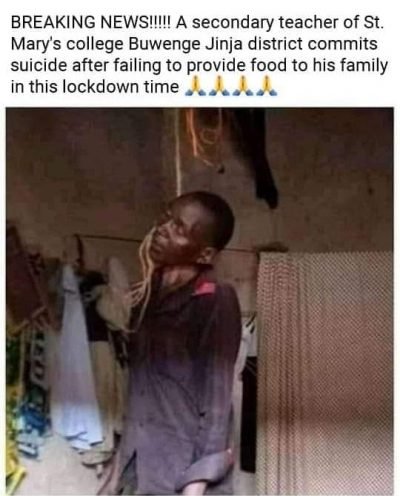Without work and a monthly paycheck for months, teachers quit teaching since they are being forced to the verge of financial disaster. Alone and unprotected, several teachers have endured the most extreme brunt of months of COVID-19-induced lockout and are searching outside the school. A random survey of destitute teachers provided a range of explanations why they switched to low-level employment such as car wash, brickmaking, charcoal-burning, hawking, motorcycle riding, taxi driving, selling beef, fruit, and vegetables, and working on building sites.
Like Issah Nsubuga, a teacher of mathematics and SST at St. Kizito, Bishop Mukwaya’s primary school, Gayaza, said that when the schools closed, he went over to sell beef. Sam Balikuddembe, a teacher at the Brillant High, Wakiso, escaped depression and started working as a painter at building sites because his fellow teachers were workers at various construction sites. He knew nothing about painting, but he knew about the work. Bogere Sylvia Nnalongo, Professor of History and CRE at St. Mathias Secondary School, Iganga, is now selling second-hand garments at the Gayaza family shop.
Many have abandoned the hope of going back to the classroom. Many teachers spoke in separate interviews of shattered hopes, lost jobs, and their daily struggles. Around the world, the COVID-19 induced lockdown is pushing away many desperate instructors from taxpayers’ positions to flooding washing bays and garages, market stalls, and any other available job.
Teachers Quit Teaching To Make Bricks
Pauline Nakisekka, a teacher of English and Mathematics at St Joseph’s Girls’ primary school in Nsambya, Uganda, has not received a paycheck since February. Threatened by hunger, Nakisekka, the three-year-old mum, switched from stylish classroom outfits to muddy brick, laying clothes with her three children when she had spent all her little earnings.
“When I realized there was no sign of lifting the lockdown for teachers, and we had eaten all the food I had stocked, I cried. I thought of setting up a shop but didn’t have capital. Then thought of poultry farming, but all the chickens and eggs were floating on the market during the lockdown, and it wasn’t a good investment at that time. I got confused,” she says in an interview.
Nakisekka reveals that she was a small-scale farmer before COVID-19 spread out. But since public transportation was also locked down, she couldn’t access the farm. Her husband was even locked up overseas, where he is working as a seasonal worker. She turned to brickmaking, as she could do the work close to home with little money to start.

“I had little experience in brickmaking. But I used to assist my husband in making bricks to build our house. However, during the lockdown, brickmaking was the easiest job to divert to since I could work near home while observing the ministry of Health COVID-19 guidelines and bricks are not perishable,” she says.
As of Tuesday, September 1, Uganda has nearly 3000 COVID-19 infections, 1,226 cases of recoveries, and over 20 fatalities. She and her children wake up at 6:00 A.M and go to Namavundu, Gayaza, where she rented land to make bricks.
What is the Fate of Teachers after Covid-19?
The Shs 2 billion SACCO money that the government gave to teachers will not benefit a great deal, since they receive a loan from a group of thirty teachers, and then each group receives Shs 30 million. This ensures that one teacher only receives SHS 1 million at a specific interest rate, which won’t help those who can’t afford to take a loan. She tried to dig and break the soil to make bricks using a wooden brick shaper. Her children helped her. But after some days, they all had back problems because their bodies weren’t used. They almost gave up their work.
She didn’t give up but told her kids to fetch water to soften the soil to make bricks. To date, a stack of 10,000 bricks has been burned and sold. She invested back the profits and saved Shs 600,000 (US$175) for her children’s school fees for when they reopen schools. Nakisekka says she’s going to make bricks to increase her wages side by side with her teaching salary.
Most teachers have struggled through the lockdown, but they can shift their flawed viewpoint regarding casual employment and reflect on what they can gain from other occupations. Teachers are accustomed to being smart and sitting in the classroom, awaiting monthly payment. But as the world evolves now, it’s wise to get a side-by-side income job. Many teachers suffered from school closures lacking hand-income employment. Concrete block-makers are not hopeless; they are successful entrepreneurs, with work and substantial savings. Teachers should not disregard other jobs if they want to thrive.
Nakisekka encouraged policymakers to provide teachers with counseling before returning to classrooms as they reopen schools since most of them have suffered from poverty mentally and physically.












